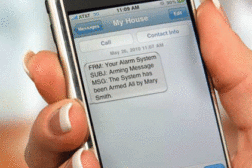Home » cellular communications
Articles Tagged with ''cellular communications''
How Reliable Is Your Alarm Communicator?
Taking stock of technologies used for alarm signal transmission shows that the security industry has done a great job of working with cellular and broadband providers to improve reliability and instill confidence.
July 23, 2012
When Selling the Cell
Getting the price right is key to operating a successful customer-conversion program from POTS to wireless alarm signal transmission. Add-ons can help maximize cellular system appeal and profitability.
August 15, 2011
Cellular Alarm Communications Goes Mainstream
No longer just a solution for remote accounts, cellular now is the preferred alarm communications method for many alarm dealers. Here’s what dealers need to know about their cellular choices — and what’s new with the technology.
June 22, 2011
Be in the forefront of security intelligence when you receive SDM.
Join over 10,000+ professionals when you subscribe today.
SIGN UP TODAY!Copyright ©2025. All Rights Reserved BNP Media.
Design, CMS, Hosting & Web Development :: ePublishing




